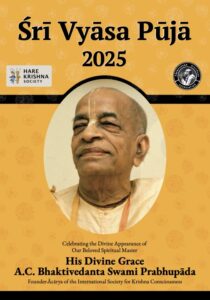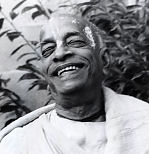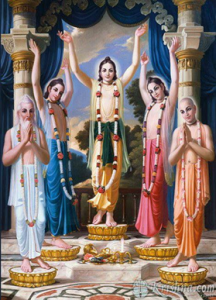Can a neophyte devotee be a pure devotee of the Lord??
Madhya 15.106-Śrī Caitanya Mahāprabhu replied, “Whoever chants the holy name of Kṛṣṇa just once is worshipable and is the topmost human being.
PURPORT–Śrīla Bhaktisiddhānta Sarasvatī Ṭhākura says that simply by chanting the holy name of Kṛṣṇa once, a person becomes perfect. Such a person is understood to be a Vaiṣṇava. With such faith and belief, one may begin a life of Kṛṣṇa consciousness, but an ordinary person cannot chant the holy name of Kṛṣṇa with such faith.
A devotee who believes that the holy name of the Lord is identical with the Lord is a pure devotee, even though he may be in the neophyte stage. By his association, others may also become Vaiṣṇavas.
One is known as a materialistic devotee if he simply worships the Deity of Hari with faith but does not show proper respect to the devotees and to others. This is confirmed in Śrīmad-Bhāgavatam (11.2.47): arcāyām eva haraye pūjāṁ yaḥ śraddhayehate na tad-bhakteṣu cānyeṣu sa bhaktaḥ prākṛtaḥ smṛtaḥ
“Anyone who engages with faith in the worship of the Deity of Hari but does not show proper respect to the devotees and to others is known as a materialistic devotee.“ However, by associating with a neophyte devotee who believes that the holy name of the Lord is identical with the Lord, one can become a devotee also. When Lord Caitanya was teaching Sanātana Gosvāmī, He said: śraddhāvān jana haya bhakti-adhikārī ‘uttama’, ‘madhyama;’, ‘kaniṣṭha’–śraddhā-anusārī yāhāra komala-śraddhā, se ‘kaniṣṭha’ jana krame krame teṅho bhakta ha-ibe ‘uttama’ rati-prema-tāratamye bhakta-taratama
“A person who has attained firm faith is a real candidate for advancing in Kṛṣṇa consciousness. According to the faith, there are first-class, second-class and neophyte devotees. One who has preliminary faith is called kaniṣṭha, or a neophyte. The neophyte, however, can become an advanced devotee if he strictly follows the regulative principles set down by the spiritual master. The pure devotee whose faith advances becomes a madhyama-adhikārī and uttama-adhikārī.” (Cc. Madhya 22.64,69-70)
It is thus concluded that even a neophyte devotee is superior to the karmīs and jñānīs because he has full faith in chanting the holy name of the Lord. A karmī or a jñānī, regardless of his greatness, has no faith in Lord Viṣṇu, His holy name or His devotional service. One may be advanced religiously, but if he is not trained in devotional service, he has very little credit on the transcendental platform. Even a neophyte devotee engaged in Deity worship in accordance with the regulations set forth by the spiritual master is in a position superior to that of the fruitive worker and speculative philosopher.
Adi 7.73–“Simply by chanting the holy name of Kṛṣṇa one can obtain freedom from material existence. Indeed, simply by chanting the Hare Kṛṣṇa mantra one will be able to see the lotus feet of the Lord.
PURPORT-The holy name and the Lord are identical. One who is completely free from the clutches of māyā can understand this fact.
Some Conclusions- Two verses, two purports and they say so much. The first one above is where Sri Caitanya Mahaprabhu flatly states that anyone who chants the Holy Name just once, is the topmost human being and is worshipable. Srila Bhaktisiddhant maharaja says that person is to be considered a Vaisnava. And Prabhupada goes on to say that even if such a devotee is in the neophyte stage, if he has full faith that the Holy name of Krsna and Krsna Himself are identical, then he is a pure devotee. The last purport clarifies it even more and states that if one is completely free of the clutches of maya,. then that devotee can understand that the Lord and His holy name are identical. Right after Prabhupada mentions this neophyte status, he says that if one worships the deity, but does not show proper respect for others, especially devotees, then he remains a materialistic devotee.
Here , below is one very fine such example of two pure devotees and personal associates of Mahaprabhu who Prabhupada states are a kanistha or neophyte bhaktas. And all because they didnt have sufficient knowledge to defeat the mayavadis in Benares.
So the final conclusion is-even if one doesn not have full knowledge to defeat mayavadis, atheists, etc, if he is full faith in the holy names and is ” free of the clutches of maya”, then he is a pure devotee and can make others into devotees as well by his association.
Hare Krsna
damaghosa das
————————————–
Adi 7.50-“How long can we tolerate the blasphemy of Your critics against Your conduct? We should give up our lives rather than hear such blasphemy.
PURPORT
One of the most important instructions by Śrī Caitanya Mahāprabhu regarding regular Vaiṣṇava behavior is that a Vaiṣṇava should be tolerant like a tree and submissive like grass.
… One should be very meek and humble in his personal transactions, and if insulted a Vaiṣṇava should be tolerant and not angry. But if there is blasphemy against one’s guru or another Vaiṣṇava, one should be as angry as fire. This was exhibited by Lord Caitanya Mahāprabhu. One should not tolerate blasphemy against a Vaiṣṇava but should immediately take one of three actions. If someone blasphemes a Vaiṣṇava, one should stop him with arguments and higher reason. If one is not expert enough to do this he should give up his life on the spot, and if he cannot do this, he must go away. While Caitanya Mahāprabhu was in Benares or Kāśī, the Māyāvādī sannyāsīs blasphemed Him in many ways because although He was a sannyāsī He was indulging in chanting and dancing. Tapana Miśra and Candraśekhara heard this criticism, and it was intolerable for them because they were great devotees of Lord Caitanya. They could not stop it, however, and therefore they appealed to Lord Caitanya Mahāprabhu because this blasphemy was so intolerable that they had decided to give up their lives.
Adi 7.51-“The Māyāvādī sannyāsīs are all criticizing Your Holiness. We cannot tolerate hearing such criticism, for this blasphemy breaks our hearts.”
PURPORT-This is a manifestation of real love for Kṛṣṇa and Lord Caitanya Mahāprabhu. There are three categories of Vaiṣṇavas: kaniṣṭha-adhikārīs, madhyama-adhikārīs and uttama-adhikārīs. The kaniṣṭha-adhikārī, or the devotee in the lowest stage of Vaiṣṇava life, has firm faith but is not familiar with the conclusions of the śāstras. The devotee in the second stage, the madhyama-adhikārī, is completely aware of the śāstric conclusion and has firm faith in his guru and the Lord. He, therefore, avoiding nondevotees, preaches to the innocent. However, the mahā-bhāgavata or uttama-adhikārī, the devotee in the highest stage of devotional life, does not see anyone as being against the Vaiṣṇava principles, for he regards everyone as a Vaiṣṇava but himself. This is the essence of Caitanya Mahāprabhu’s instruction that one be more tolerant than a tree and think oneself lower than the straw in the street (tṛṇād api su-nīcena taror iva sahiṣṇunā). However, even if a devotee is in the uttama-bhāgavata status he must come down to the second status of life, madhyama-adhikārī, to be a preacher, for a preacher should not tolerate blasphemy against another Vaiṣṇava. Although a kaniṣṭha-adhikārī also cannot tolerate such blasphemy, he is not competent to stop it by citing śāstric evidences. Therefore Tapana Miśra and Candraśekhara are understood to be kaniṣṭha-adhikārīs because they could not refute the arguments of the sannyāsīs in Benares. They appealed to Lord Caitanya Mahāprabhu to take action, for they felt that they could not tolerate such criticism although they also could not stop it.




